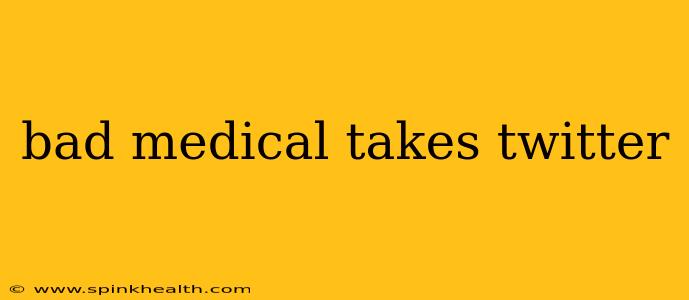The internet, a boundless ocean of information, can sometimes feel like a turbulent sea of misinformation. Nowhere is this more apparent than on platforms like Twitter, where medical advice – good, bad, and downright dangerous – flows freely. This isn't about silencing opinions; it's about understanding how harmful "bad medical takes" spread and how we can navigate this digital landscape more safely. This isn't just an issue for doctors and researchers; it impacts every one of us.
What Constitutes a "Bad Medical Take"?
A "bad medical take" on Twitter, or any social media platform, isn't simply a differing opinion. It's information presented as fact that is either demonstrably false, misleading, lacks proper context, or is presented without the necessary qualifications. These can range from promoting unproven remedies to spreading conspiracy theories about vaccines and diseases. Think of it as medical advice whispered in the crowded marketplace, lacking the rigorous testing and peer review that characterizes genuine medical knowledge.
Why Do Bad Medical Takes Spread So Quickly?
The rapid spread of misinformation on Twitter is a complex phenomenon. Several factors contribute:
Emotional Appeals and Confirmation Bias:
People often gravitate toward information that confirms their existing beliefs, regardless of its accuracy. Fear, anxiety, and desperation related to health issues make individuals particularly vulnerable to emotionally charged, yet factually flawed, claims. A tweet promising a quick fix for a chronic illness will likely resonate more strongly than a nuanced explanation of a complex medical condition.
The Algorithmic Amplification of Misinformation:
Twitter's algorithms, like those of other social media platforms, prioritize engagement. Controversial or sensational tweets, even if false, often attract more attention and interaction than accurate, balanced information. This creates a feedback loop that pushes misinformation to a wider audience.
Lack of Accountability and Fact-Checking:
The speed and anonymity afforded by social media platforms can create an environment where misinformation spreads rapidly and accountability is lacking. While Twitter has introduced fact-checking measures, the sheer volume of posts makes thorough verification nearly impossible.
How Can We Combat the Spread of Bad Medical Takes?
The fight against medical misinformation is a collective effort. It requires a multi-pronged approach involving individuals, platforms, and healthcare professionals:
Critical Thinking and Media Literacy:
Developing strong critical thinking skills is crucial. Before accepting any health-related information online, verify it against reputable sources like the CDC, WHO, or peer-reviewed medical journals. Learn to identify red flags such as exaggerated claims, unsubstantiated evidence, and appeals to emotion over reason.
The Role of Healthcare Professionals:
Doctors, nurses, and other healthcare professionals play a vital role in combating misinformation. Actively engaging in online discussions, correcting inaccuracies, and promoting reliable information sources are essential to counteract false narratives.
Platform Accountability:
Social media platforms must take responsibility for the content shared on their platforms. Implementing stricter content moderation policies and investing in effective fact-checking mechanisms are essential steps towards mitigating the spread of misinformation.
What are the consequences of believing bad medical takes?
Consequences of believing bad medical takes can be severe and range from:
- Delayed or inadequate treatment for serious illnesses: Relying on unproven remedies can delay seeking necessary medical care, leading to worse health outcomes.
- Harmful side effects from unproven treatments: Many unproven treatments have potential side effects that can be just as dangerous, if not more so, than the condition they claim to cure.
- Financial exploitation: Individuals may be scammed out of large sums of money for treatments that are not effective.
- Erosion of public trust in healthcare professionals and institutions: The spread of misinformation can lead to a decline in trust in reliable sources of health information.
How can I identify a bad medical take on Twitter?
Identifying a bad medical take requires a critical and discerning eye. Look for these red flags:
- Lack of credible sources: Does the tweet cite reputable scientific studies or medical journals? Or does it rely on anecdotal evidence, personal testimonials, or dubious websites?
- Overly simplistic explanations of complex issues: Medicine is often nuanced; beware of overly simplistic explanations that ignore complexities.
- Claims that contradict established medical knowledge: Does the information contradict what mainstream medical professionals and organizations are saying?
- Sensationalized language and emotional appeals: Does the tweet use fear-mongering tactics or overly dramatic language to grab attention?
- Promoting unproven or disproven treatments: Is the tweet promoting alternative cures or treatments that haven't been rigorously tested or approved by regulatory bodies?
In conclusion, navigating the complex world of online health information requires vigilance and critical thinking. By understanding how misinformation spreads and developing strong media literacy skills, we can protect ourselves and contribute to a more informed and healthier online environment. The fight against bad medical takes is ongoing, but with collective effort, we can make a difference.

